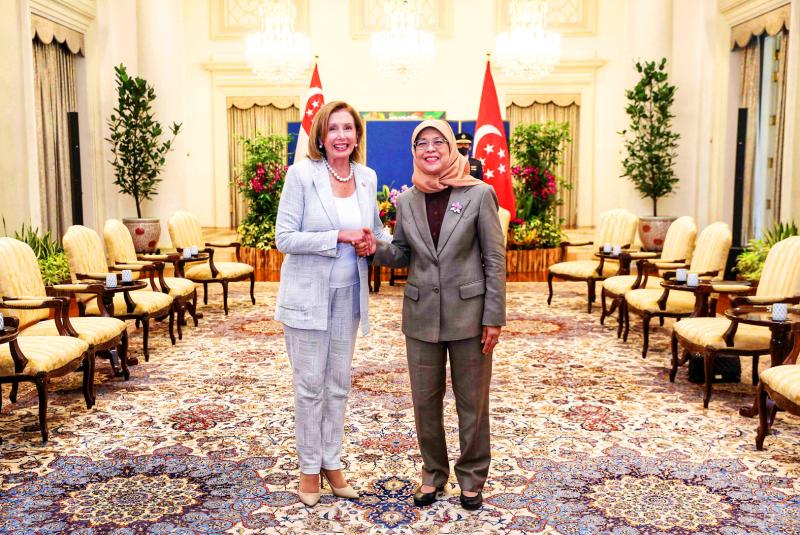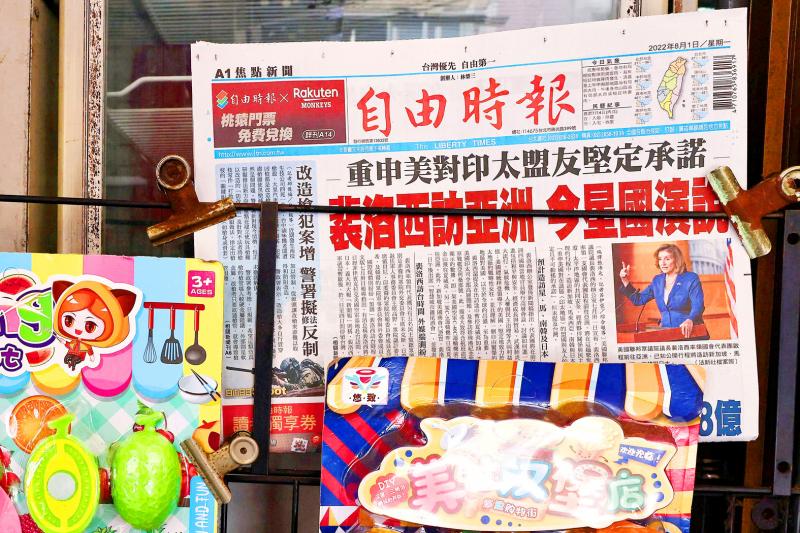If US House of Representatives Speaker Nancy Pelosi comes to Taiwan, she would likely arrive this evening or tomorrow morning after visiting Malaysia, a US analyst said yesterday.
According to the China Press, a Malaysian Chinese-language newspaper, she is to arrive in Kuala Lumpur today for her second stop.
Although the Malaysian government has not announced an official itinerary, the paper cited a person familiar with the plans as saying she would only stay for a few hours.

Photo: AFP / Singaporean Ministry of Communications and Information
Meanwhile, South Korean National Assembly Speaker Kim Jin-pyo’s office yesterday said he would meet with Pelosi on Thursday morning before holding a news conference and eating lunch together.
Based on Pelosi’s itinerary thus far, Josh Rogin, a political analyst for the Washington Post and CNN, on Twitter yesterday predicted that “the Taiwan stop would likely be after her Malaysia stop, meaning Tuesday night or Wednesday morning.”
Sources yesterday told the Chinese-language Liberty Times (sister paper of the Taipei Times) yesterday that the time of Pelosi’s arrival in Taiwan would be close to what others have speculated.

Photo: Ann Wang, Reuters
Arrangements are being made, including a public appearance with a visit to the Legislative Yuan tomorrow, they said, adding she would also meet with President Tsai Ing-wen (蔡英文).
However, given the sensitivity involved, plans would change according to situations, they added.
Meanwhile, local media quoted other sources as saying that Pelosi could possibly stay at the Grand Hyatt Taipei in Xinyi District (信義) or the Marriott Taipei in Zhongshan District (中山).
Asked about the potential visit, Premier Su Tseng-chang (蘇貞昌) did not confirm or deny the possibility, but said Taiwan welcomed all foreign guests and promised to make the best arrangements with respect to their itineraries.
Pelosi arrived in Singapore early yesterday for the first stop on her Asia tour.
Pelosi met with Singaporean Prime Minister Lee Hsien Loong (李顯龍), President Halimah Yacob and other Cabinet members, the Singaporean Ministry of Foreign Affairs said.
Lee welcomed a US commitment to strong engagement with the region and the two sides discussed ways to deepen US economic engagement through initiatives such as the Indo-Pacific Economic Framework, the ministry said in a statement.
Lee and Pelosi also discussed the war in Ukraine, tensions surrounding Taiwan and China, and climate change, it said.
Lee “highlighted the importance of stable US-China relations for regional peace and security,” it added, in an apparent allusion to reports that Pelosi could visit Taiwan.
In Beijing, Chinese Ministry of Foreign Affairs spokesman Zhao Lijian (趙立堅) reiterated earlier warnings, saying “there will be serious consequences if she insists on making the visit.”
He did not spell out any specific consequences.
“We are fully prepared for any eventuality,” he said. “The People’s Liberation Army will never sit by idly. China will take strong and resolute measures to safeguard its sovereignty and territorial integrity.”
Washington has tried to assure Beijing there is no reason to “come to blows” and that if such a visit occurred, it would signal no change in US policy.

‘CORRECT IDENTIFICATION’: Beginning in May, Taiwanese married to Japanese can register their home country as Taiwan in their spouse’s family record, ‘Nikkei Asia’ said The government yesterday thanked Japan for revising rules that would allow Taiwanese nationals married to Japanese citizens to list their home country as “Taiwan” in the official family record database. At present, Taiwanese have to select “China.” Minister of Foreign Affairs Lin Chia-lung (林佳龍) said the new rule, set to be implemented in May, would now “correctly” identify Taiwanese in Japan and help protect their rights, the Ministry of Foreign Affairs said in a statement. The statement was released after Nikkei Asia reported the new policy earlier yesterday. The name and nationality of a non-Japanese person marrying a Japanese national is added to the

AT RISK: The council reiterated that people should seriously consider the necessity of visiting China, after Beijing passed 22 guidelines to punish ‘die-hard’ separatists The Mainland Affairs Council (MAC) has since Jan. 1 last year received 65 petitions regarding Taiwanese who were interrogated or detained in China, MAC Minister Chiu Chui-cheng (邱垂正) said yesterday. Fifty-two either went missing or had their personal freedoms restricted, with some put in criminal detention, while 13 were interrogated and temporarily detained, he said in a radio interview. On June 21 last year, China announced 22 guidelines to punish “die-hard Taiwanese independence separatists,” allowing Chinese courts to try people in absentia. The guidelines are uncivilized and inhumane, allowing Beijing to seize assets and issue the death penalty, with no regard for potential

‘UNITED FRONT’ FRONTS: Barring contact with Huaqiao and Jinan universities is needed to stop China targeting Taiwanese students, the education minister said Taiwan has blacklisted two Chinese universities from conducting academic exchange programs in the nation after reports that the institutes are arms of Beijing’s United Front Work Department, Minister of Education Cheng Ying-yao (鄭英耀) said in an exclusive interview with the Chinese-language Liberty Times (the Taipei Times’ sister paper) published yesterday. China’s Huaqiao University in Xiamen and Quanzhou, as well as Jinan University in Guangzhou, which have 600 and 1,500 Taiwanese on their rolls respectively, are under direct control of the Chinese government’s political warfare branch, Cheng said, citing reports by national security officials. A comprehensive ban on Taiwanese institutions collaborating or

STILL COMMITTED: The US opposes any forced change to the ‘status quo’ in the Strait, but also does not seek conflict, US Secretary of State Marco Rubio said US President Donald Trump’s administration released US$5.3 billion in previously frozen foreign aid, including US$870 million in security exemptions for programs in Taiwan, a list of exemptions reviewed by Reuters showed. Trump ordered a 90-day pause on foreign aid shortly after taking office on Jan. 20, halting funding for everything from programs that fight starvation and deadly diseases to providing shelters for millions of displaced people across the globe. US Secretary of State Marco Rubio, who has said that all foreign assistance must align with Trump’s “America First” priorities, issued waivers late last month on military aid to Israel and Egypt, the